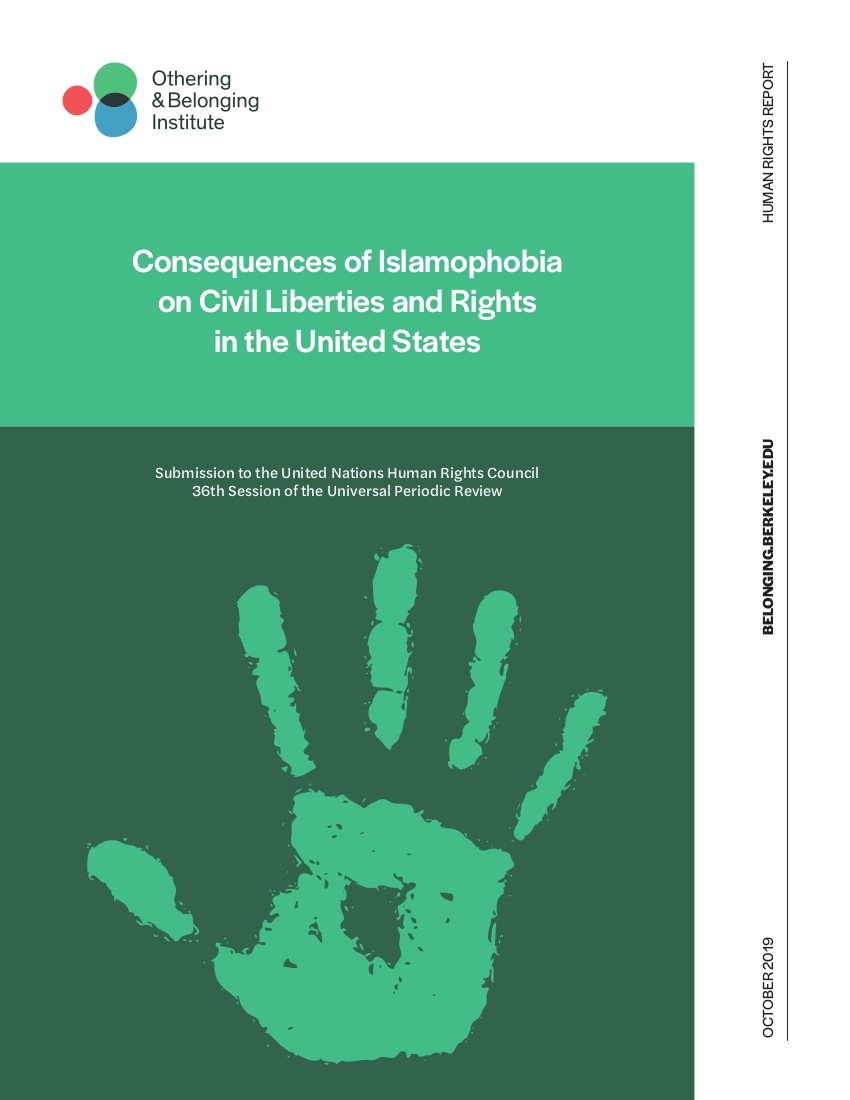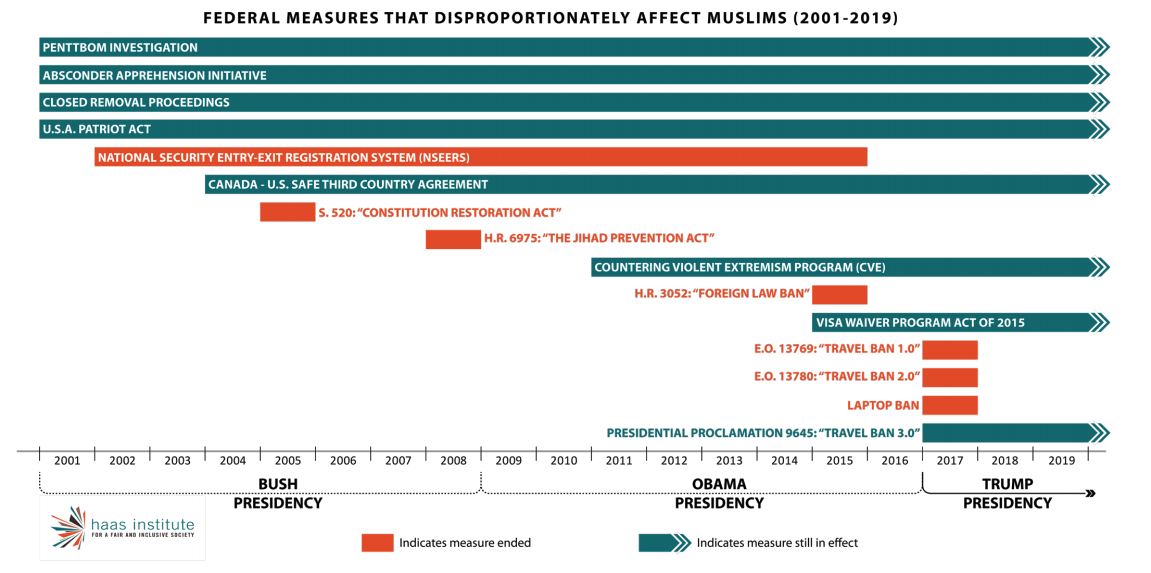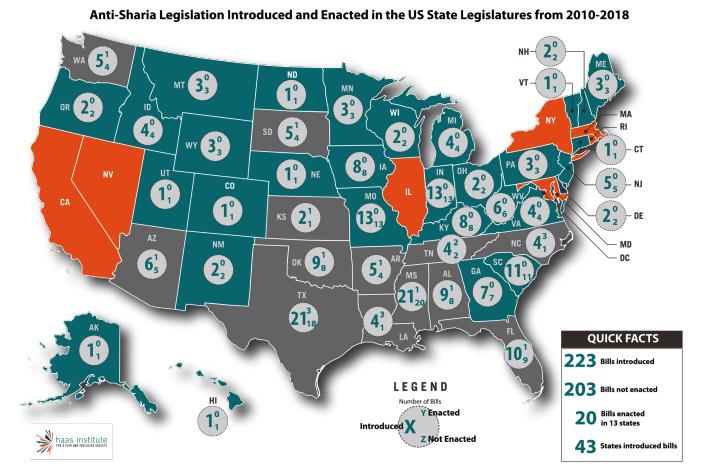Click to download a PDF of this report.
This report is published by the Othering & Belonging Institute at UC Berkeley. The Institute engages in innovative research and strategic narrative work that attempts to reframe the public discourse from a dominant narrative of control and fear towards one that recognizes the humanity of all people, cares for the earth, and celebrates our inherent interconnectedness.
The report was submitted on October 1, 2019 to the United Nations Human Rights Council in regards to the Universal Periodic Review (UPR) of the United States of America, 36th Session.
This publication is part of the Global Justice Program’s Human Rights Agenda report series. In this series, we collaborate with other human rights, civil rights, and civil society organizations under the umbrella of the US Human Rights Network (USHRN) to advance the utility of the rights-based framework as a meaningful organizing tool for impacted communities and social movements to articulate claims of social, cultural, and political rights, and belonging. Our reports are reviewed by the United Nations Human Rights Commission, and the Human Rights Council, and inform the UN’s recommendations to hold the US Government and legislative bodies accountable to their obligations as related to the Universal Periodic Review (UPR), the International Convention on the Elimination of all forms of Racial Discrimination (ICERD), and the International Covenant on Civil and Political Rights (ICCPR).
I. SUMMARY:
1. For nearly two decades, and spanning three presidencies, the US federal government and state governments have infringed on the freedoms of its citizens and lawful residents by systematically institutionalizing federal measures and state legislation that disproportionately discriminate against, and other Muslims. Since 2001, 15 federal measures* were implemented that target and discriminate against Muslim individuals and communities, the most recent of which is President Donald Trump’s Travel Ban. These measures subject Muslims to unwarranted surveillance, profiling, exclusion, and discrimination along the lines of race, ethnicity, national origin, and religion.
2. These federal measures and state legislation are preventing the US from maintaining its obligations to the Universal Declaration of Human Rights and the Universal Periodic Review (UPR), as well as US ratified international treaties, notably, the International Covenant on Civil and Political Rights (ICCPR), and the International Convention on the Elimination of All Forms of Racial Discrimination (ICERD).
* Of the 15 federal measures, 7 are no longer in effect. For a comprehensive timeline of the measures and their status see the infographic “Federal Measures that Disproportionately Affect Muslims (2001 – 2019).”
3. Presidential Proclamation 9645, known as the Travel Ban or otherwise referred to by the American Civil Liberties Union (ACLU) and others as the Muslim Ban,
4. The numerous iterations of the Travel Ban have made longstanding US immigration laws invalid by creating unwarranted chaos and obstacles for US citizens and lawful permanent residents (LPRs or Green Card holders) to reunite with family members.
5. Still, one of the most evident markers of increased Islamophobia is the rise of anti-Sharia legislation in US state legislatures, demonstrating that discriminatory, anti-Muslim sentiment and policy is not limited to the US federal government. Since 2010 there have been 223 anti-Sharia bills introduced in 43 state legislatures.
II. US NEGLIGENCE IN REGARDS TO ITS INTERNATIONAL HUMAN RIGHTS COMMITMENTS:
6. The US government, by enacting and institutionalizing measures that disproportionality discriminate against Muslims, has undermined its own obligations under the Universal Declaration of Human Rights, specifically Article 2 and Article 18. Additionally, anti-Muslim state legislation also undermine the civil and constitutional rights of Muslims in the United States and compromise the US government’s compliance with the ICERD, notably Article 2, ¶1(c), and Article 5 (d)(vii), as well as the ICCPR, particularly in regards to Articles: 2(1), 18(1), 23(1), 26, and 27.
7. While there are no recommendations from the 2015 Universal Periodic Review that directly address the Travel Ban or anti-Sharia legislation, this submission references selected recommendations as related to freedom of religion and freedom from discrimination, as these freedoms and rights are subverted by the US government’s implementation of preemptive national security and counterterrorism efforts, which continue to justify policies that violate the civil liberties and rights of its citizens and lawful residents who adhere to Islam. The recommendations from the 2015 Universal Periodic Review include:
a) 176.108 That a mechanism be established at the federal level to ensure comprehensive and coordinated compliance with international human rights instruments at the federal, local and state levels (Norway).
US response: Supported a part of the recommendation relating to the coordination of international human rights instruments at the federal level, but did not support the ask to create a single mechanism that would apply to the state and local levels.
b) 176.126 Abolish any discriminatory measures that target Muslims and Arabs at airports (Egypt).
US response: Supported a part of the recommendation to prohibit measures that discriminate against Muslims and Arabs at airports, and rejected the implication that measures were in place at US airports that target or discriminate against Muslims.
c) 176.120 Strengthen the existing laws and legislation in order to combat different forms of discrimination, racism and hatred (Lebanon).
US response: Supported a part of the recommendation to combat discrimination, but did not support parts of the recommendation that the US believed would restrict constitutionally protected beliefs or expression.
d) 176.132 Toughen its efforts to prevent religion and hate crimes as it is evident that the crimes are on the increase (Nigeria).
US response: Supported the recommendation to strengthen efforts to prevent and punish hate crimes motivated by religious hatred, but rejected assertion that hate crimes are on the rise in the US.
e) 176.142 Address discrimination, racial profiling by the authorities, Islamophobia and religious intolerance by reviewing all laws and practices that violate the rights of minority groups, with a view to amending them (Malaysia).
US response: Supported the recommendation to address discrimination and racial profiling by authorities, but did not support parts of the recommendation that the US believed would restrict constitutionally-protected beliefs or expression.
f) 176.160 Take steps to eradicate discrimination and intolerance against any ethnic, racial or religious group and ensure equal opportunity for their economic, social and security rights (Turkey).
US response: Supported the recommendation.
g) 176.131 Continue to take strong actions, including appropriate judicial measures, to counter all forms of discrimination and hate crimes, in particular those based on religion and ethnicity (Singapore).
US response: Supported the recommendation.
h) 176.149 Combat racial profiling and Islamophobia on a non-discriminatory basis applicable to all religious groups (Pakistan).
US response: Supported the recommendation.
8. Since 2015, the US government has not only failed to adequately address the above-mentioned recommendations, but has implemented federal measures as well as sanctioned state policies that directly institutionalize and foment Islamophobia and intolerance toward Muslims. As of 2017, three versions of the Travel Ban have been introduced, and on June 26, 2018, the US Supreme Court upheld Presidential Proclamation 9645—the third version of the ban—in a 5-4 ruling in the case Trump v. Hawaii. The Travel Ban has received widespread international criticism, including by a number of UN human rights experts.
9. In a case which drew international criticism and attention to the nature and effects of the Travel Ban and the visa waiver process, the Council of American-Islamic Relations (CAIR) filed a lawsuit in 2018 on behalf of Shaima Swileh, a Yemeni woman who sued the Trump administration to enter the US to be reunited with her husband and two-year-old son, Abdallah Hassan, who was receiving medical treatment in the country for a terminal genetic brain disorder. She was granted a visa following the emergency federal lawsuit and arrived to the US only days before her son’s death.
10. In April 2019, the UN Human Rights Committee, in their “List of issues prior to submission of the fifth periodic report of the United States of America,” specifically asks the United States government to address the ability of individuals to obtain visas under the Travel Ban, as well as to address the visa-waiver process, which has a rejection rate of 98 percent.
11. Additionally, from 2015 to 2018, 78 anti-Sharia bills were introduced in state legislatures across the nation, and five of those bills were enacted into law. It has been evidenced that anti-Sharia legislation is doubly fueling Islamophobia and resulting in a negative impact on the US legal system, ultimately transforming the everyday decisions made in US courtrooms by the enactment of such laws.
12. As noted in the Human Rights Committee’s Concluding Observations from 2014, the Committee observed that the federal government needs to “give greater effect to the Covenant at federal, state, and local levels, taking into account that the obligations under the Covenant are binding on the State party as a whole.”
III. RECOMMENDATIONS:
13. In order to uphold its constitutional and international commitments to safeguard human rights, the US government must extend and protect human rights of all persons within its jurisdiction, regardless of race, religion, or national origin. To achieve this, the US government must:
a) Protect the rights of Muslim individuals as enshrined in the US Constitution and rule of law, and consider Islamophobia as a form of religious discrimination and discrimination based on national origin.
b) Immediately rescind the Travel Ban, Presidential Proclamation 9645, as the federal measure discriminates on the basis of race, religion, and national origin, and separates families, as well as infringes on the human rights of individuals within and outside of US territory, disproportionately affecting Muslims and Muslim refugees.
c) Establish a visa waiver process for the Travel Ban that is compliant with the ICERD and US immigration law, which forbids discriminatory practices, as well as to reconsider cases that were denied the visa waiver and to expedite visas to qualifying families and individuals.
d) Prevent the enactment of discriminatory anti-Muslim policies by ensuring that the US Constitution, ICERD, and ICCPR are fully implemented at federal, state, and local levels.
e) Rescind anti-Sharia legislation that have been enacted into law and implement policies to prevent anti-Sharia legislation from being reintroduced and enacted as the laws are inherently discriminatory and xenophobic, and infringe on the constitutional rights of Muslims and nonMuslims within US territory, but disproportionately affecting Muslims.
f) Prevent the enactment of discriminatory anti-Muslim policies by establishing a single mechanism to coordinate compliance that would apply at state and local levels.
g) Pass in the US Senate, and sign into law, H.Res.183 of the 116th Congress, which condemns anti-Semitism, anti-Muslim discrimination, and bigotry against minority groups.







